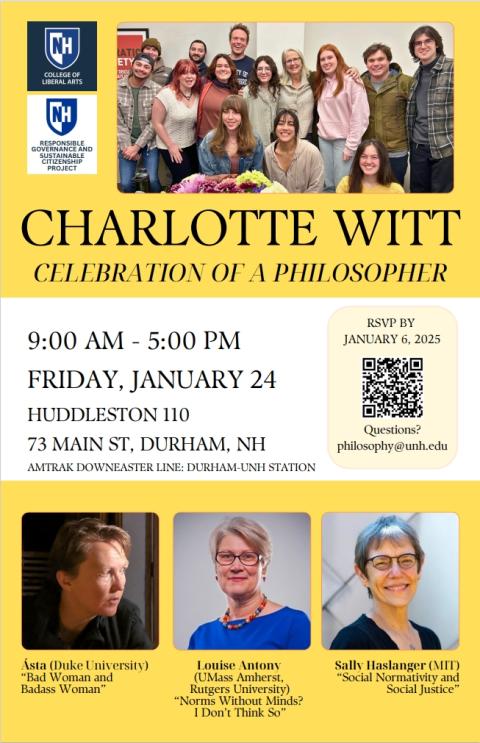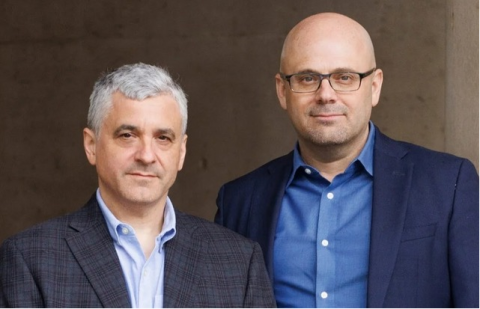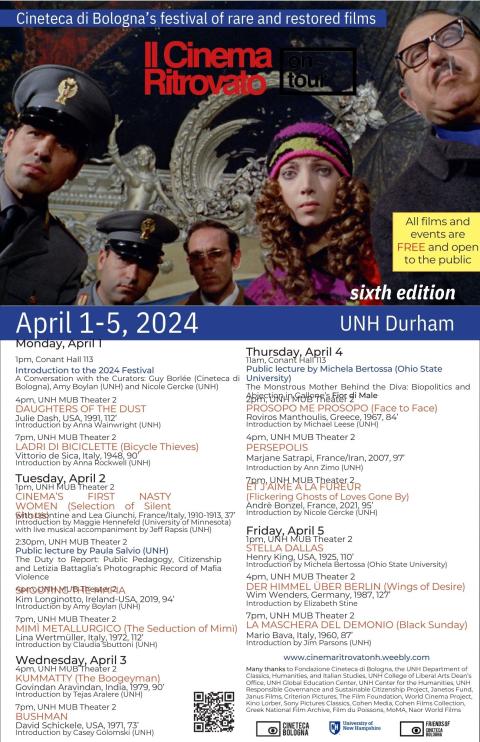The Civil Discourse Lab & Lambda Pi Eta Present: Undivide Us

The Civil Discourse Lab and Lambda Pi Eta (the Communication Honors Society) would like to invite UNH students, faculty, staff and community members to the showing of Undivide Us. Undivide Us (2023) explores the forces driving division in America and brings to light how everyday citizens with different backgrounds and beliefs can reclaim civil discourse. Through expert analysis and real-life conversations, this documentary film explores the roots of toxic polarization and offers strategies on how we can counteract the divides in our country. The Civil Discourse Lab will lead facilitated, small group discussion after the film.
The CDL & LPE Present: Undivide Us
Tuesday, April 15th, 5:30 p.m. to 8:30 p.m. (free community dinner 5:30-6:00 p.m.)
Strafford Room, Memorial Union Building (MUB) 2nd Floor, UNH, Durham campus
Check-in begins at 5:15 p.m. outside the Strafford Room
Event Dinner 5:30-6:00 p.m.
Event Introduction 5:50 p.m.
Showing of Undivide Us 6:00-7:15 p.m.
Community conversation 7:15-8:30 p.m.
Undivide Us description:
"As news and social media amplify a narrative of an America on the brink of civil war, politicians in Washington, DC stir conflict: red against blue, rich against poor, urban against rural, race against race, and man against woman. They cast us as enemies locked in battle, usurping power and posing as our saviors. UNDIVIDE US challenges the idea that citizens who disagree are not capable of civil conversation and demonstrates the truth that, even in our differences, the American experiment is still alive and well. It exposes the power players in Washington DC as the true disruptors of peace, driving our legitimate differences to the brink of disaster. Hear from experts about the roots of this toxic polarization and learn how to counteract it in our local communities and lives."
Charlotte Witt: Celebration of a Philosopher Conference
With the support of UNH COLA and RGSCP, the Department of Philosophy celebrates the career of faculty emerita Charlotte Witt on January 24, 2025. The conference features the following presentations:
- Ásta, Duke University: "Bad Woman and Badass Woman"
- Louise Antony, UMass Amherst and Rutgers University: "Norms Without Minds? I Don't Think So"
- Sally Haslanger, MIT: "Social Normativity and Social Justice"

CIRCLE Event: What Should We Do About NH Lakes and Climate Resilience?
Wednesday, November 20 from 5:00 p.m. to 7:30 p.m. (free community dinner 4:45-5:30 p.m.) in the Strafford Room, Memorial Union Building (MUB) 2nd Floor, UNH, Durham campus OR UNH Franklin Pierce Law School in Concord Wood Board Room 228 (1st floor)
The UNH Civil Discourse Lab would like to invite you, and NH citizens concerned about keeping our lakes resilient, to attend our inaugural Conversations at the Intersection of Research and Community Listening Exchange (CIRCLE) event. This event represents the launch of a new series focusing on research at the intersection of community health and climate resilience.
The event will begin with a keynote from our first CIRCLE Engaged Research Fellow Mary Stampone (Associate Professor of Geography and NH State Climatologist): “Safeguarding New Hampshire’s Lakes: Strategies for Resilience Amid Climate Variability.” After the keynote, the audience will engage in facilitated, interactive, roundtable deliberation to prioritize concerns and policies around keeping New Hampshire’s lakes healthy and sustainable.
How Democracies Die
Wednesday, October 30 - Sunday, November 3, 2024
A theatrical exploration of the New York Times best-selling book by Steven Levitsky and Daniel Ziblatt. The play, devised by UNH students, will delve into the book’s examination of how we have arrived at this moment in our democracy. As stated in the Wall Street Journal’s review; “The authors argue, with good evidence, that democracies aren’t destroyed because of the impulses of a single man; they are, instead, degraded in the course of a partisan tit for tat dynamic that degrades norms over time until one side sees an opening to deliver the death blow.” The result of more than twenty years of studying the breakdown of democracies from the 1930s to the present, the book’s authors have provided an artistic springboard to understand how democracies die, and how ours can not only be saved, but thrive.
The creation of this play was supported in part by a generous grant from the Responsible Governance and Sustainable Citizenship Project (RGSCP). The play will be part of a larger program, How Democracies Die/Thrive, that will feature speakers and panels leading up to the production.
How Democracies Die is a work of nonfiction by Steven Levitsky and Daniel Ziblatt (Crown, 2018).
Tyranny of the Minority:
Why American Democracy Reached the Breaking Point

Monday, April 8
4pm in 210 Ham Smith
Dr. Steven Levitsky
David Rockefeller Professor of Latin American Studies and
Professor of Government
Harvard University
Dr. Daniel Ziblatt
Eaton Professor of Government
Harvard University
Please join us for the annual John T. Holden Lecture as we welcome Steven Levitsky and Daniel Ziblatt of Harvard University.
Drawing on insights from their latest book, Tyranny of the Minority , Levitsky and Ziblatt will present a wealth of examples – from 1930s France to present-day Thailand – to explain why and how political parties turn against democracy. They will also offer reflections on the current state of democracy in the United States, and the ways the Constitution leaves the United States vulnerable to attacks from within, arguing that It is a pernicious enabler of minority rule, allowing partisan minorities to consistently thwart and even rule over popular majorities. Levitsky and Ziblatt will also present examples from other democracies – from Germany and Sweden to Argentina and New Zealand – who have taken steps to update and strengthen their governmental frameworks, and present strategies for reforming U.S. democracy.
The Holden Lecture is supported by the John T. Holden Memorial Fund in the College of Liberal Arts, which was established in 1995 in memory of John Holden, one of the university’s outstanding professors of political science, who served that department for 25 years, many as chair. The fund is dedicated to bringing signal scholars in the social sciences to UNH.
What can we learn from Claudine Gay?: The politics of citation, plagiarism, & the spread of ideas in the social sciences
Thursday, February 22, 12:40-2:00PM, MUB Theater II
Join us for a roundtable discussion reflecting on the recent resignation of Harvard President Claudine Gay, a political scientist, due to plagiarism allegations. Topics to be addressed include the politics of how we value and attribute ideas in academia and society, the role of technology in enabling and identifying plagiarism, and how academic citation serves as a tool to trace the spread of original ideas. Panelists include faculty from the political science and international affairs department, and Dimond Library. Refreshments will be served. Event is supported by the Responsible Governance & Sustainable Citizenship Project (RGSCP).
Il Cinema Ritrovato
April 1-5, 2024

